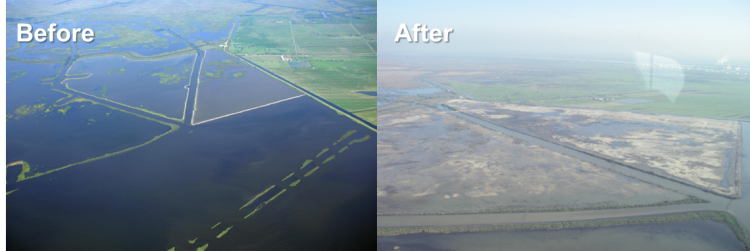The 5th Annual NOAA/Northern Gulf Institute Gulf Hypoxia Research Coordination Workshop (see "previous workshops - 2014") brought together Louisiana state officials, federal and other state agencies, NGOs, and academic scientists with interests in identifying a path forward to restore Louisiana's coastal wetlands, reduce the size of the annual Gulf of Mexico hypoxic zone, and sustain the ecological and socioeconomic benefits of fisheries. This diverse group identified and ranked challenging priority management needs to sustain fisheries in a region where habitat changes are expected due to large-scaleecosystem restoration efforts and river diversions critical tosaving wetlands.
The proceedings paper from that meeting, ' Advancing Ecosystem Modeling of Hypoxia and Diversion Effects on Fisheries in the Northern Gulf of Mexico, ' is now available and will inform ongoing efforts to ensure that adaptive management decisions for diversions would be science-driven and have a formal process to adjust management actions to ensure that restoration goals are most effectively achieved.

Restoring coastal Louisiana requires balancing wetland restoration, flood control, sediment delivery, nutrient management, hypoxia mitigation, and the health of coastal Fisheries. The Mississippi River Sediment Delivery System-Bayou Dupont project, before and after . Credit: USGS National Wetlands Research Center, Lafayette, Louisiana
A follow-up meeting co-led by NOAA and Louisiana Coastal Protection and Restoration Authority, employed the use of socio-economics and adaptive management when planning river diversions. Two major efforts came out of the October 2015 meeting:
- A multi-agency strategy for the development of socio-economic data and tools needed to assist project decision-making and adaptive management of diversion operations; and
- Recommendations to consider in the development of adaptive management plan development and implementation for river diversion projects.
NCCOS is a major partner in the restoration of the Northern Gulf of Mexico environment through the Gulf of Mexico Ecosystems & Hypoxia Assessment ( NGOMEX ) program.
For more information, contact Alan.Lewitus@noaa.gov.
 Official websites use .gov
A .gov website belongs to an official government organization in the United States.
Official websites use .gov
A .gov website belongs to an official government organization in the United States. Secure .gov websites use HTTPS
A lock or https:// means you’ve safely connected to the .gov website. Share sensitive information only on official, secure websites.
Secure .gov websites use HTTPS
A lock or https:// means you’ve safely connected to the .gov website. Share sensitive information only on official, secure websites.